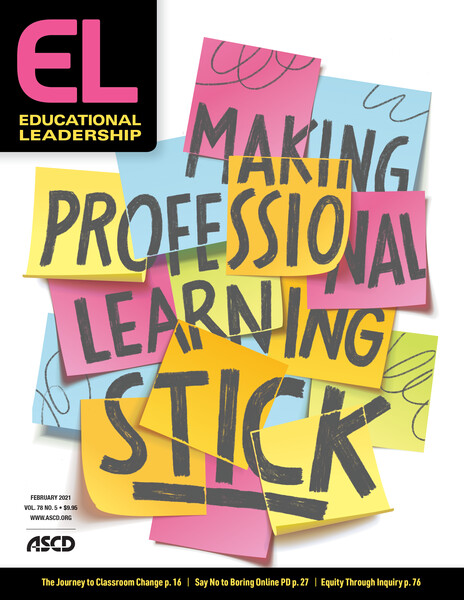February 1, 2021
•
5 min (est.)•
Vol. 78•
No. 5Seeing the Curriculum with Fresh Eyes
Race can be an important—and enriching—lens to apply to any unit of study.

My sophomore classes open the school year reading and discussing Lord of the Flies, a canonical text that is, on its surface, exceedingly white. It was written by a white man, William Golding, who uses a group of little white boys to prove a thesis steeped in Eurocentric, Hobbesian philosophy. This book would fail any racial Bechdel test, and not by a close margin. And yet, some of the richest race conversations in my classes have popped off while discussing Lord of the Flies.
In the process of exploring the individual symbols that make up Golding's allegory, students reliably notice his central strategy: As the boys on the island "lose their humanity" and "become more savage," they take on the caricatured behaviors associated with indigenous peoples around the world. At the beginning, characters say things like, "We've got to have rules and obey them. After all, we're not savages. We're English, and the English are best at everything." Then they paint their faces. They do rain dances. They hunt. They walk around in various stages of undress. As the boys become more evil, they become less "white." Finally, for good measure, Golding has Piggy—the story's intellectual compass—shout, "Which is better—to be a pack of painted Indians like you are, or to be sensible?" His classmates, apparently choosing the former, kill him seconds later.
My students have an absolute field day with this. Just who does William Golding think he is? How dare he use BIPOC folx to symbolize the innate evil that lies within each of our hearts, held tenuously at bay by Society? C'mon! We have a good time comparing Golding's racist fever dream with a recent news story that describes a real-life example of Tongan boys being stranded on an island for 15 months—with no murders at all.
We explore the consequences of Golding's "British are best at everything" stance as much as we explore its origins. For instance, as freshmen, many of my students explored the previous year how, thousands of years before Golding, the folks in ancient Greece were using stories about Odysseus to feel good about themselves. In particular, students were eager to discuss the moment in Homer's The Odyssey where the hero, fresh from raping and pillaging his way through multiple towns, has the gall to call the Cyclops "lawless brutes" simply because, in his myopic opinion, they "never plant with their own hands" and because they "have no meeting place for council … and each is a law unto himself." The spectacular cognitive dissonance on display here is a spot-on introduction to the ideologies that undergird colonialism. Students, in fact, refer to it all year long.
It is no doubt important for us, in the view of the peerless #DisruptTexts team, to "center the authentic voices and lived experiences of people of color." (Be sure to check out their website at https://disrupttexts.org.) Our students deserve not only to see themselves in their curriculum, but to explore these important issues patiently and thoroughly. We should never stop curating not just our texts, but also our instructional practices, to make sure that antiracism is at the forefront of all that our students experience in our classrooms.
And yet, some of us might have understandable reasons for sticking with traditional texts. In some cases, we might not be allowed to change the books that we teach. In other cases, we can select our own books but there is no money in the budget, and we don't want to ask friends and family to contribute to another Donors Choose project. For these and many other reasons rooted in the inequities baked into our education systems, we find ourselves stuck teaching books by white men, featuring white men, and originally meant for an audience of white men. The question then becomes, do we let this hamstring our ability to discuss race thoughtfully in the classroom?
The answer, I'd argue, is an emphatic no. The Lord of the Flies and The Odyssey examples from my classroom illustrate one of the most important takeaways from the professional development sessions I lead: We must think of race not as a subject that begins and ends with any particular unit of study, but as one of the most important lenses that can be applied to any unit of study. (This is true also of gender, sexuality, class, and other discourses that are ordinarily corralled into silos.)
A book doesn't need to try to be a race book to be a race book. When a race lens is applied to Lord of the Flies, it acts like a prism, generating many meaningful classroom conversations. When applied to The Odyssey, it might only add one or two more (so far, but who knows!). In both cases, students are not only challenged by the unanticipated demand of exploring a text from unique angles, but in my experience, they just flat-out enjoy the units more.
Respecting race as one of the most powerful critical lenses not only has the potential to breathe life into our driest units of study, but it also takes the pressure off of any one magic unit to get the job done. Say, for example, a student doesn't like The Hate U Give for some strange reason. No worries. They haven't missed the year's only opportunity to discuss race! We'll try again with Macbeth, and this time they might not see it coming.
Teachers who respect race as a lens don't have to hit equity-talk home runs. We unleash a barrage of singles over the course of the entire school year. Furthermore, leaders who respect race as a lens are quicker to critique not just the more obvious of their school's systems and procedures that are linked to racial inequity (such as discipline), but also those that without deliberate attention, would never receive a race-conscious analysis. This might help them notice previously unexamined legacy practices, like policies on late homework, that might actually be a clear detriment to students of color.






